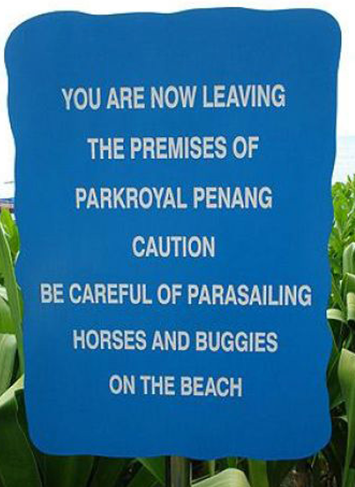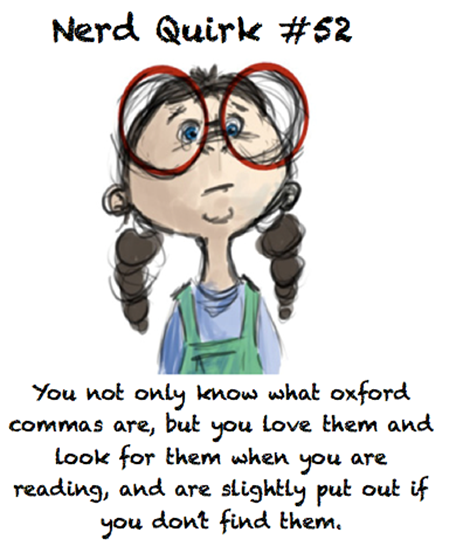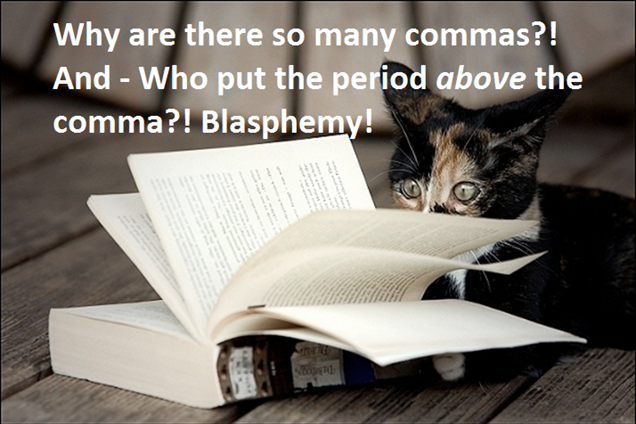Nitty Gritty: Commas
Nitty Gritty: Commas
Did I already mention that grammar was my personal nightmare? Well, meet its best friend, the comma.
This is a comma: ,
Looks pretty small and insignificant, huh? That is just a disguise, don't fall for it. It likes to be underestimated.
The comma has the power to break apart and rearrange sentences.
With power comes great possibility - and endless potential for confusion.
A Warning: Whatever you do, do not rely on my stories for examples of proper comma use. I was taught to write with minimal punctuation and had to relearn a lot of it over the years - and many of my stories haven't been updated. This isn't exactly a bad thing on Wattpad, but it would give any high school English teacher (or editor/proofreader) nightmares. So, in this case, do as I say and not as I do. If in doubt, Google is your ally, you can use a writing guide, or you can even consult with an English teacher if you are still in school.
I have found Grammarly's guide to be one of the clearer, and more helpful, guides: https://www.grammarly.com/blog/comma/
I've started relying on the Chicago Manual of Style for consistency.
Contrary to popular belief, commas don't just signify a pause in the sentence.
There are actual rules as to when to use commas, but that involves a lot of jargon and terms such as clause, conjunction, and verb. I won't bore you with such technical terms. If you are curious as to the fine details or would love to learn all the proper terms, Google would love to tell you all about it.
Repeat after me: I love commas. (When you believe it, come find me...)
For comma use around dialogue, please refer to the previous chapter.
Here are some other comma basics.
Comma use with lists:
When listing things, use a comma between the words.
Example: I bought oranges, apples, and rutabagas.
The comma before 'and' is called an Oxford comma. It is optional depending on your writing style, but it is preferred in most published novels.
You don't need a comma if there are less than three terms, you simply join them with 'and'.
Correct: I grabbed the keys and bear spray.
Incorrect: I grabbed the keys, bear spray.
Incorrect: I grabbed the keys, and bear spray.
Commas when describing something:
I gazed at the small, blue butterfly. [because the two words describe the butterfly, there is a comma between them.]
Or we can reword it if you don't like that comma: I gazed at the blue butterfly, surprised by how small it was.
A few more examples:
I gently pet the soft, grey rabbit.
Wrapping up in the warm, fluffy blanket, I fell asleep.
Commas to join two short sentences:
Commas are weird. Sometimes they can even replace periods in some situations. Sometimes they allow you to break a sentence in half and put the back half at the front.
Example: When I looked to my right, I saw a bear.
Example: I scratched my head, trying to understand the confusing lesson.
Example: Walking slowly, I watched the sun set.
Example: While jogging along the path, I listened to music.
Comma Splice:
Note: When joining two short sentences, make sure that they can't stand on their own.
Example (Incorrect): I loved to read, Nicky liked to sing. [These two sentences can stand on their own. I loved to read. Nicky liked to sing. If you can replace the comma with a period without impacting the sentence, then it is a comma splice. Try to avoid this minor error.]
Commas around introductory adverbs: (Yeah, I used a big word. Sorry. I will try to avoid it in the future)
Chances are you know what I mean, but just don't understand the definition.
An introductory adverb generally ends in 'ly' and explains the how. If you read it out loud, you tend to pause in that spot.
Example: Surprisingly, the bear started to tap dance.
Example: Finally, she got on with the lesson.
Example: However, I wasn't sure if I had done anything wrong.
Commas around names or objects:
Very necessary. It generally separates who you are talking to, from the rest of the sentence.
Correct: Let's eat, Grandma.
Incorrect: Let's eat Grandma. (No, you really don't want to become a cannibal...)
Correct: Nicky, don't paint that...
Incorrect: Nicky don't paint that...
Correct: On Tuesday, don't wear pink, ladies.
Incorrect: On Tuesday, don't wear pink ladies. (I thought that was pretty self-explanatory...)
Correct: This is Mary, she is new here.
Incorrect: This is Mary she is new here. [Note missing comma.]
Correct: Come meet my older sister, Mary, she works at the pharmacy. [Note the second comma before Mary, this is because it would have been two very short sentences. We combined two comma rules here. We also could have replaced the second comma with a period and then just added another detail to the second sentence.]
Incorrect: Come meet my older sister Mary, she works at the pharmacy. [You need a comma between sister and Mary.]
Commas around 'and': (I recently spent 30 minutes reviewing and refreshing my knowledge of this, so don't feel bad.)
Welcome to one of the more confusing areas regarding commas. I will try to keep it simple. (Fingers crossed.)
PS. Many new readers will tend to skim over this to avoid being overloaded with small details. If nothing else, just keep your comma usage consistent.
'And' is a very common word used to join parts of a sentence together. Sometimes we need a comma before the 'and'. Other joining words include: or, but, since, however, etc.
For a very general rule, if both parts of the sentence can stand on their own as a true sentence, add a comma. If not, no comma.
Let's look at a few examples.
Correct: I threw the stick and watched it narrowly miss the window.
Incorrect: I threw the stick, and watched it narrowly miss the window. [I threw the stick. Watched it narrowly miss the window.] The second part is dependent on the first sentence, so the comma does not fit here.
Correct: The dog ran after the ball, and he brought back a stick. [The dog ran after the ball. He brought back a stick.] It can stand as two sentences, which means you add a comma.
Incorrect: The dog ran after the ball and he brought back a stick.
(This could also be re-worded to 'The dog ran after the ball and then brought back a stick.' Or you could also use 'but' or 'however' instead.)
Correct: I was so tired, and I had a ton of homework left to do. [I was so tired. I had a ton of homework left to do.] They can stand on their own.
Incorrect: I was so tired and I had a ton of homework left to do.
Let's get a bit more confusing. Just to liven things up.
Correct: Nicky sang and Ben played guitar.
Due to its very short length, a comma does not fit as it would make it quite 'choppy'. You could also replace 'and' with 'while' for a smoother flow. Or you could add more details to both parts.
Example: Nicky sang so badly that my ears hurt, and while she sang, Ben played the guitar loudly to try to cover up her horrendous singing.
There are other rules around commas, but the ones above are the ones you are most likely to encounter.
Commas have a lot in common with mosquitoes. It is rather hard to understand how something so small can be so annoying, but they aren't going anywhere anytime soon, so we might as well admit that they are here to stay - regardless of how annoying they are. Might as well get used to them and learn to live with them.



Bạn đang đọc truyện trên: AzTruyen.Top